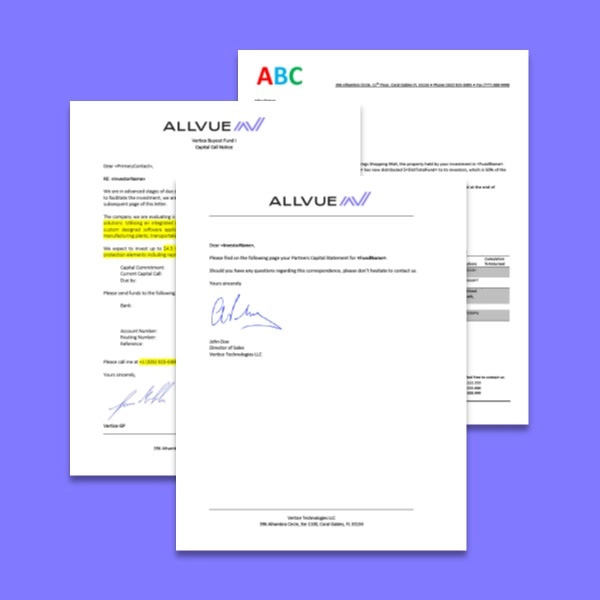DOWNLOAD A PCAP STATEMENT TEMPLATE NOW
In the world of private equity, PCAP statements play a crucial role in ensuring investor transparency and compliance with regulatory requirements — the top operating challenge for 70% of GPs, according to a recent Allvue data report. In this blog post, we will delve into the significance of PCAP statements, their purpose, and how they impact the private equity landscape.
What is a PCAP statement?
A PCAP statement, or partners’ capital account statement, serves as a means of communication between private equity firms and investors. They provide detailed information regarding the terms, conditions, and risks associated with a particular private equity investment. These statements are typically distributed to limited partners, or investors, during quarterly private equity reporting periods to update them on the value of their holdings in the private equity fund.
Purpose of PCAP statements
The primary purpose of PCAP statements is to ensure transparency and investor protection. By disclosing essential private equity fund accounting information, private equity firms facilitate a fair and informed investment process. PCAP statements contain crucial details such as fees and expenses, liquidity terms, appreciation or the fund, and other key figures in summing up fund performance.
LP benefits and considerations
- Informed decision making: PCAP statements equip investors with the necessary information to make informed investment decisions. By understanding the investment strategy, risks, and fees associated with a private equity fund, investors can evaluate the opportunity in a more comprehensive manner.
- Risk management: Through detailed risk disclosures, PCAP statements enable investors to assess the risks associated with a private equity investment. This allows investors to align their risk tolerance with the investment opportunity and make appropriate risk management decisions.
- Regulatory compliance: PCAP statements play a crucial role in complying with regulatory requirements imposed by authorities such as the Securities and Exchange Commission (SEC) or other relevant governing bodies. These statements help private equity firms meet their obligations to provide adequate disclosure to investors, fostering trust and maintaining regulatory compliance.
ALLVUE IN ACTION: Watch how Allvue’s Fund Accounting solution handles quarter-end reporting
GP challenges in managing PCAP statements
If taking on the quarterly investor reporting process manually via a solution like Excel or QuickBooks, struggling with gathering, analyzing, and presenting the vast amounts of data required for these reports is a common hurdle. When reporting to potentially hundreds of investors, each with different shares and some with custom LPA conditions, GPs are bound to encounter errors and risk providing investors with an incorrect look at their shares’ standing and performance.
The task becomes even more daunting when considering the need to distill complex financial and operational information into an easily understandable and digestible report. On top of this, managers face the pressure of meeting tight reporting deadlines while ensuring accuracy.
These considerations emphasize the importance of capable technology to smoothly manage the quarterly reporting and PCAP statement generation process. With the right accounting and reporting systems, private equity managers can enhance the investor reporting experience, building trust and strengthening investor relationships in the process.
Download a PCAP statement template
To see what a typical PCAP statement looks like, download Allvue’s template below.
PCAP statements are a vital component of the private equity landscape, promoting transparency, investor protection, and regulatory compliance. By providing essential information related to performance and fees, PCAP statements empower investors to make informed decisions and manage their risks effectively. Private equity firms must prioritize the creation and distribution of comprehensive PCAP statements to foster a positive investor experience, but without the right infrastructure powering your fund, performing quarterly reporting and generating PCAP statements becomes a chaotic and error-prone process.
Allvue’s Fund Accounting software – a cloud-based, multicurrency general ledger – makes quarterly reporting easy, allowing managers to automatically generate individual PCAP statements and other professional investor-ready private equity reports, such as capital calls, in just minutes.
For more information, you can:



